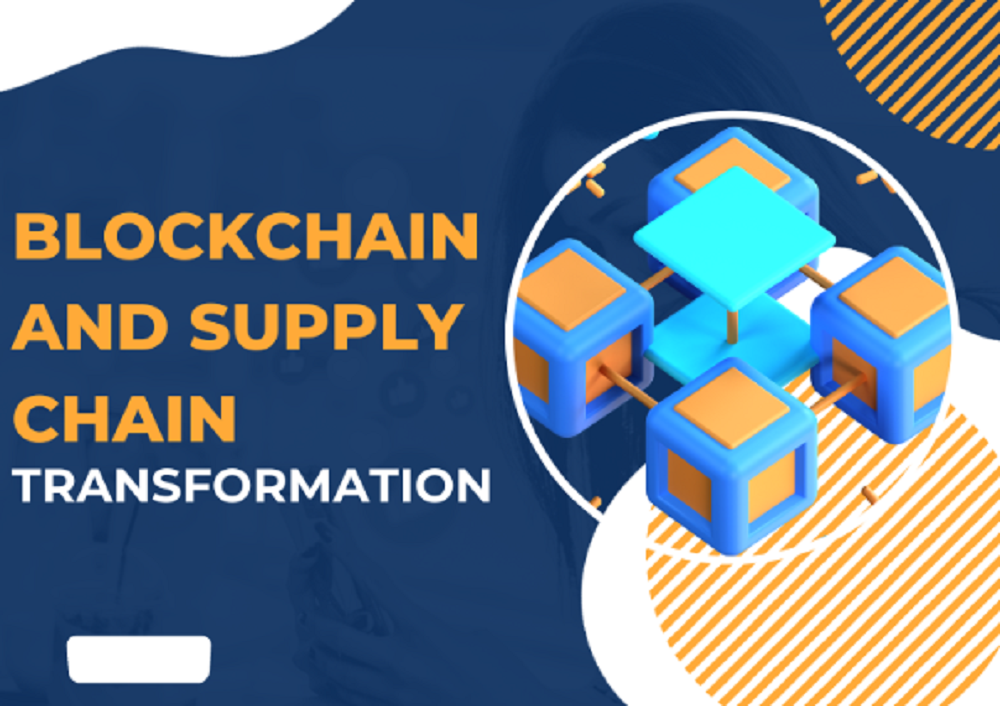Blockchain and Supply Chain Transformation
Supply chain management is essential for companies in today's global economy to ensure they can keep their competitive edge in the face of constant change. For the sake of saving money, preventing theft, and guaranteeing that items are genuine, it is crucial to be able to follow their journey from manufacturer to store shelf.
However, due to their inherent limits in openness, security, and interoperability, traditional supply chain systems generally need help to satisfy these objectives. The advent of blockchain technology is a game-changer with the potential to alter the structure of supply networks completely.
What is Blockchain?
Blockchain is a decentralized ledger system that was primarily developed to support the digital currency Bitcoin. However, its applications are not limited to cryptographic money.
Blockchains are distributed databases that record transactions across several computers in a form that is both public and secure and cannot be altered once recorded. These monetary dealings are organized into "blocks" and linked sequentially to form a "chain." there are also a lot of Career Opportunities In Blockchain.
How Blockchain Works?
Blockchain technology operates through a consensus mechanism, typically proof-of-work (PoW) or proof-of-stake (PoS), depending on the specific blockchain. In PoW, participants (miners) solve complex mathematical puzzles to validate and add new blocks to the chain, while PoS relies on validators who hold a stake in the network.
Here's a simplified overview of how a blockchain transaction works:
- Transaction Initiation: A user initiates a transaction, such as transferring digital assets or recording supply chain data.
- Verification: The transaction is broadcast to the network, and nodes validate its authenticity and integrity through cryptographic techniques.
- Block Creation: Valid transactions are grouped together into a new block. Miners or validators compete to solve a mathematical puzzle to add the block to the chain.
- Consensus: Once consensus is reached, the new block is added to the chain, and the transaction is considered confirmed.
- Immutability: The transaction is now recorded on the blockchain, becoming a permanent and unchangeable part of the ledger.
How Blockchain is Revolutionizing Supply Chain?
As supply chains have evolved over time, companies have often failed to keep pace with technological advancements. Outdated systems like electronic data interchange (EDI) and XML messaging no longer meet the demands of modern supply chain management. These point-to-point messaging systems frequently encounter synchronization issues, leading to inventory discrepancies and logistical challenges.
With escalating costs throughout the supply chain, businesses face mounting pressures on their profit margins. Supply chain managers must navigate a complex web of processes and channels through which consumers purchase products. So, how can these outdated management systems be revitalized to address these challenges? The answer lies in blockchain technology.
Removing the Need for Intermediaries
Blockchain technology in supply chains has the potential to streamline operations by allowing businesses to share and validate crucial information without the involvement of intermediaries. In blockchain networks, transactions and data are synchronized across the entire network, with all participants verifying each other's actions.
This extensive cross-checking is the cornerstone of the reliability and security of cryptocurrencies like Bitcoin, which processes thousands of transactions daily across hundreds of network nodes.
Ensuring Accurate Traceability
Blockchain technology in supply chains transcends its role as an unhackable virtual ledger of transactions. It also offers the capability to record the status of products at every stage of their lifecycle. From initial production and manufacturing to the point of sale to customers, blockchain can meticulously track and record the journey of each individual product.
An exemplary use case of blockchain in supply chain is Walmart's implementation. Walmart utilizes blockchain to track and monitor the supply of pork from China. The technology captures and documents every detail about each piece of meat, including its origin, every step in its journey, and the date of sale to a customer.
This comprehensive data provides the company with complete visibility into the product's journey from source to shelf.
Leveraging Smart Contracts
Integrating smart contracts into supply chain management systems can help businesses prevent fraud, deceit, and other disruptions. A smart contract is a software program that operates on blockchain technology, executing predefined agreements automatically. Smart contracts are tamper-resistant, relying on their programming to trigger specific events.
For instance, if blockchain records indicate that a product has been successfully delivered, the associated smart contract can automatically trigger the payment for that delivery. This feature is particularly advantageous for suppliers who often contend with payment delays.
An excellent example of blockchain in the supply chain using smart contracts is Transactive Grid, an application built on Ethereum. Transactive Grid automates the tracking and redistribution of solar power generated from neighborhood solar panels, facilitating the buying and selling of solar energy.
Transparency in Transactions
Blockchain technology revolves around trust, transparency, and auditability. Traditional banking transactions can take days to process and may fail to go through. Blockchain enables near-instantaneous money transfers between buyers and sellers, typically completed within minutes.
Furthermore, blockchain records every transaction, creating an immutable ledger that cannot be tampered with. Information in a blockchain is stored in "blocks" distributed across the network, ensuring that all transaction participants have access to the same information.
Consequently, any attempt at fraud by one participant would disrupt the system's synchronization and be immediately detected. An illustrative example of blockchain in the supply chain is Tomcar, a vehicle manufacturer that uses Bitcoin to pay its suppliers.
Maintaining Product Integrity
Certain consumer goods, such as medicine, food, and other perishables, require specific handling conditions during transportation. Factors like temperature, humidity, and vibrations must be controlled to preserve product quality. Blockchain technology can record these conditions through sensors, storing the data in the blockchain.
Parties involved in the blockchain can be alerted instantly if these conditions deviate from established norms. This is where smart contracts prove invaluable, as they can be programmed to take corrective actions automatically.
Career Opportunities In Blockchain
Blockchain offers diverse career opportunities in blockchains across sectors. In career opportunities in blockchains, blockchain development, professionals design, code, and maintain decentralized applications (dApps) and smart contracts, ensuring security and efficiency. Blockchain analysts research and evaluate potential use cases, aiding strategic decision-making. Cryptocurrency traders navigate digital asset markets, seeking profitable opportunities. Blockchain consultants offer expertise to businesses integrating blockchain solutions. Blockchain experts are in high demand, fostering innovation in finance, supply chain, healthcare, and more career opportunities in blockchains. As the blockchain industry expands, job roles continue to evolve, providing lucrative prospects for those with blockchain skills and expertise.
Blockchain Use Cases in Supply Chain
Blockchain technology has been instrumental in the digital revolution of many different sectors. The following are some of the most compelling applications of blockchain technology in the supply chain today:
Streamline Oil Supply Chain
For the purpose of streamlining the oil supply chain, the Abu Dhabi National Oil Company (ADNOC) and the IT firm IBM have launched a blockchain supply chain system test program. The system monitors the flow of oil from the well to the consumer. The transaction processes are also automated.
Food Safety
Walmart, JD.com, IBM, and Tsinghua University launched a blockchain in supply chain strategy to increase food safety and transparency. After an E. coli incident, it is not uncommon for stores to have to sell off their entire stock of fruit and vegetables since it takes so long to determine where the contamination first began. Reduce food waste with the aid of this program that records the origin of every food item.
Fashion Sector with Martine Jarlgaard
Provenance has partnered with designer Martine Jarlgaard to increase openness in the fashion sector. The quality of the product and whether or not it was manufactured in a facility with fair working conditions for its employees will be transparent to consumers.
TagItSmartSafeguards Wine Supplies
TagItSmartOrigintrail, in partnership with TagItSmart, has successfully tracked and monitored over fifteen thousand bottles of wine. The initiative's primary objective was to reduce the black market for wine in China. Illegal sales of wine in China are believed to be over 30,000 bottles every hour.
Company Louis Dreyfus
Louis Dreyfus Co., along with Dutch and French institutions, recently completed a blockchain exchange of U.S. soybeans with a Chinese retailer. It was successful because it was cheaper and took less time to complete transactions.
Tracking Diamonds
The largest diamond producer, De Beer, announced a blockchain supply program to combat the trade in conflict diamonds. It was able to trace as many as a hundred diamonds from the mine to the cutter and polisher to the jeweler. The system was updated at each stage to provide the customer the current status of the diamonds, including images demonstrating their colour, quality, and position.
Bext 360 and Kahawa's 1893
Kahawa 1893, a direct trade coffee firm, and Bext 360 have launched an effort to promote gender parity in the Kenyan coffee industry. Bext 360's blockchain application in the supply chain improved production monitoring and made it easier for female coffee farmers to get paid for their work.
Origintrail
Blockchain has been utilized extensively by Origintrail, Source Certain International, and Hoan Vu to trace the food source chain. The two labs ran 800 chemical and forensic analyses on the products and submitted the data to the Origintrail blockchain. Food safety is one of many things that could be monitored and guaranteed if this strategy were implemented throughout all businesses.
Conclusion
In conclusion, blockchain has ushered in a new era of transparency, trust, and efficiency in supply chains. While challenges remain, the benefits of blockchain in supply chain transformation are undeniable. As businesses and industries continue to embrace this technology, we can expect to see further innovation and improvement in how goods are produced, distributed, and consumed. Blockchain has created a more resilient, secure, and responsive global supply chain ecosystem.












